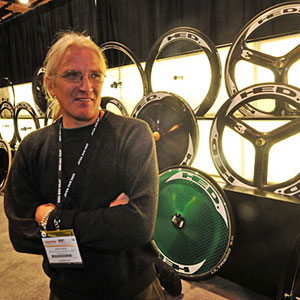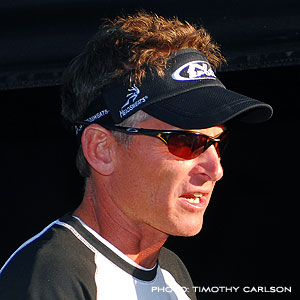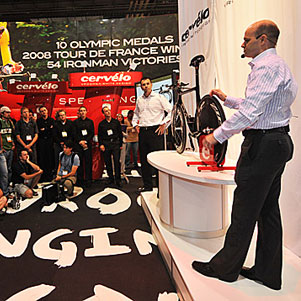Careers in triathlon

So You Want to Be a Rock 'n Roll Star? crooned the Byrds, satirizing manufactured neo-Beatles groups during the 1960s. If you're a triathlete, you probably haven't fantasized about life in a boy band, rather, whether there's a way you can swap your career as a lawyer, or an IBM salesman, for a career in the sport you love.
So you want to be a rock and roll star?
Then listen now to what I say.
Just get an electric guitar [or collapsible bike racks]
Then take some time and learn how to play.
And here is what I say: Don't do it! Stay with your chosen profession! Forewarned is forearmed! That established…
As an intellectual exercise I asked myself who, over the course of their lives, have made the most money in, or from, the sport of triathlon. Few own up to what they earn, and most who I'd ask are friends and I wouldn't have the nerve to put the earnings question to them. So, I can't know for sure. But I have a pretty good guess.
As an editorial note: The photos here are of Steve Hed (wheel manufacturer) and of Graham Fraser (race producer). This is not to suggest either did or didn't make my list, rather, that I happen to have photos of these two industry notables in my archive.
My list includes 5 race owners and 5 manufacturers. No athletes. But I can't be certain, and, one or more athletes might make the top-10 list. But if it's about career earnings longevity is important. An athlete can only make a list like this if he or she continues to earn in triathlon through a career that survives the racing years.
Almost everyone to whom I talk—accountants, technical writers, sales managers—who wants a career in triathlon first thinks about owning a retail store. In my opinion, next to being a pro triathlete, this is the least likely path to wealth in triathlon.
But in every case, in any aspect of the sport, little money is to be made if you're not the owner of your business. The exception are certain categories of key employees—a CFO, for example—who reaps a financial benefit upon the sale of a company. But this doesn't mean only the founders reap the rewards. When Zipp and Zoot were sold to SRAM and K2 respectively, the founders of those companies did not reap whatever largesse was there to be had, rather it was subsequent owners.
Manufacturing has one thing going for it that none of these other vocations have: The "brand" seems to be able to sell at a premium. For some reason, buyers of races and of retail outlets don't want to attach a premium to these types of businesses, but they will to a manufacturing brand. Though I must regrettably acknowledge that I don't make my own list (not even close), the brands that triathlon has built or is building—Zipp, HED, Cervelo, De Soto, Zoot, 2XU—along with brands that triathlon greatly aided, like Giro, have the potential to do well by their owners.
At the same time, there are brands (let's take Softride as an example) that were novel ideas and generated a lot of interest but just couldn't quite get over the hump. For every brand that makes it, 10 or 20 limp along or die trying.

Often, the reason that manufacturers make my list is because of what they got upon the sale of their businesses. It's less likely that a premium attaches to a race series, because determining the "ownership" of a race is not straightforward. IMG owns the Escape to Alcatraz Triathlon. When this company replaced race directors for next year, swapping Terry Davis for Bill Burke, Terry applied for and was granted permits for his own "Alcatraz" triathlon. The ability to leverage relationships and constituencies often provides a de facto equity that erodes any nominal race ownership.
Nevertheless, in some cases a brand is important. While Graham Fraser built and owned a formidable list of athletes and local community contacts, Jim Gills presumably made more money selling WTC to Providence Equity Partners than Fraser made selling North American Sports to WTC.
But Fraser is not done. As noted, it's often about relationships, and constituencies, and Fraser has both. Toward the leveraging of those assets, he finally has something he never had while "owning" Ironman races, namely, his own brand: Centurion Sports).
For those in these trying economic times who're looking for an entry into triathlon-as-occupation, perhaps the single best enterprise is race owning, for these reasons:
1. The math is hard to ignore for low-cost races that have over 1000 entrants, especially so if the race series you own takes in, season-long, 10,000 entries. If I expanded my top-10 list to, say, the top-25, yes, athletes would start to show up on this list, but, race owners would dominate the list. (Still, how many race series take 10,000 entries during a season?)
2. The barrier to entry is low. Race organizing is an enterprise in which you can engage without having very much bank to begin with.
3. The cash flow model is attractive: You get the money before you have to spend very much of the money.
That established, there are some hard facts to this business. For every Keith Jordan; or Rck Kozlowski; or Andy Robles; or Bill Scott or Terry Davis; there are 20 or 30 who struggle, who can't make a living, but who continue to put on their races, or worse, their races pull them under.
You have to be very talented to do this business right, and your talent has to be broad. It's not just that you need the knowledge of an MBA, you also have to be very good at "seeing" a course, its traffic patterns, its ease of production, and not everybody has the ability to think spatially. You've got to have nerves of steel, because when the gun goes off you're sending athletes out to possible death or injury. When one or the other occurs, it's with your knowledge that if you hadn't gone into this line of work your customer would be home that evening having dinner with his wife and children.
Meanwhile, on Saturday and Sunday mornings, while your buddies are out on the long rides and runs you used to go on, you're herding a boy scout troop through a parking lot as you all put flyers under windshield wipers.
Welcome to your new career 😉
I don't know one, single, successful race organizer who entered the profession because he wanted to make a lot of money, or even because he wanted to work full time as an RD. In every case, the successful RD just "saw" a race in his head and wanted to put it on. The mentality of a good RD is the mentality of a surfer who looks out at the perfect wave and thinks it ought to be surfed. The best RDs "see" the perfect race on the perfect course and then endeavor to put it on. If the races end up being successful, great, but, that's not the motivator.
The Muddy Buddy series is an example. Bob Babbitt didn't charge an entry fee, at all, for the first several years of his mountain bike ride-and-tie in San Diego (the original Muddy Buddy). He never saw that event as a money maker. For years, it was just a labor of love.
As triathlon progresses, I expect another class of entrepreneur to join the top-10 list: the independent rep. If the bottom fell out of my financial life, but if I still owned a reputation, that would be my best play. Like building a race, building a territory of shops to which you sell manufactured goods is low-cost; mostly your sweat equity. It's hard, thankless, work in the beginning. But some of the highest earners I know in the sporting goods industry are independent reps.
Of course, how can one engage in this sort of work if one can't afford to take the time to build up a business? That's for each person to decide. Me, I was a college degreed software salesman when I first conceived of Quintana Roo in 1986. I quit my day job, and got a job waiting tables at night. Fortunately, I was a better wetsuit maker than a waiter.
Just think twice, maybe three times, before you decide to be a triathlon industry star. I can think of a fair number of industry folks who'd take my old job waiting tables right about now.


